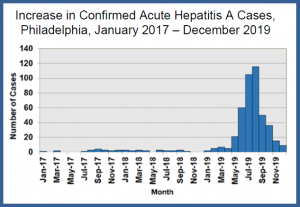The hepatitis A virus (HAV) outbreak in Philadelphia remains an ongoing public health emergency affecting the City. Although HAV transmission activity has declined compared with the summer months, the Philadelphia Department of Public Health (PDPH) has recently identified HAV cases among persons living homeless in Center City along with other at-risk persons. Based on preliminary data, 426 locally-acquired HAV cases were reported to PDPH in 2019, of whom, the majority (60%) are adults who reported injection or non-injection drug use. A quarter were also experiencing homelessness. Thirty-six percent of cases have no reported risk factors. To date, four fatalities have occurred in persons with underlying chronic conditions and fulminant infection.

Hepatitis A vaccination continues to be the most important tool to prevent disease and stop this outbreak. Many adults in Philadelphia, especially those who use drugs or are experiencing homelessness, may not have a consistent medical provider. Thus, it is important to promote vaccine to anyone at high risk for HAV infection or serious complications at every opportunity and in any care location. Vaccinate:
- People who use injection or non-injection drugs
- People experiencing homelessness or unstable housing
- People who are or were recently incarcerated
- Men who have sex with men (MSM)
- People with chronic liver disease (cirrhosis, hepatitis B, and hepatitis C)
- People with HIV (New Advisory Committee on Immunization Practices’ Recommendation)
- Persons who work with or reside in communities with at-risk persons should also be vaccinated including healthcare workers, community service and food service providers
If your facility does not have HAV vaccine on-hand, please encourage patients to visit a pharmacy if they have insurance. Patients can also be advised to visit PDPH-sponsored HAV vaccine clinics at the Kensington Storefront (2774 Kensington Ave) on Fridays in January from 12pm–2pm. If additional assistance getting Hepatitis A vaccine is needed, contact PDPH at 215-685-6740. Organizations who serve at-risk persons are encouraged to contact PDPH to schedule HAV vaccination clinics.
- Identify and report cases: Promptly report acute HAV cases to PDPH by calling 215-685-6740 (after hours: call 215-686-4514).
- Recommend HAV control and prevention measures for cases:
- Offer HAV vaccine to susceptible, close contacts of cases (e.g., household members, sex partners, persons who shared drugs with the case). Guidance for use of post-exposure vaccine is available at: https://www.cdc.gov/mmwr/volumes/67/wr/mm6743a5.htm.
- Advise HAV cases to take other steps to prevent transmission, such as hand washing, avoiding food preparation for others, condom use, and harm reduction practices while contagious (1 week after jaundice onset or if no jaundice, 2 weeks after illness onset).
For ongoing updates and resources please see: https://hip.phila.gov/EmergentHealthTopics/HepA
Originally released by the Philadelphia Department of Public Health on January 9, 2020.




